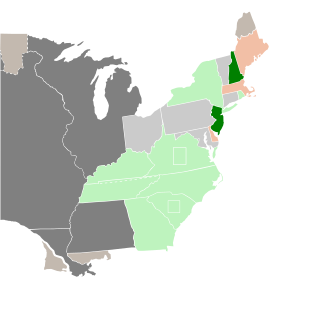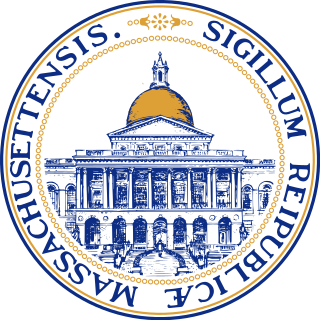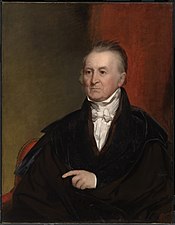
The 1804–05 United States Senate elections were held on various dates in various states. As these U.S. Senate elections were prior to the ratification of the Seventeenth Amendment in 1913, senators were chosen by state legislatures. Senators were elected over a wide range of time throughout 1804 and 1805, and a seat may have been filled months late or remained vacant due to legislative deadlock. In these elections, terms were up for the senators in Class 2.

The 1802–03 United States Senate elections were held on various dates in various states. As these U.S. Senate elections were prior to the ratification of the Seventeenth Amendment in 1913, senators were chosen by state legislatures. Senators were elected over a wide range of time throughout 1802 and 1803, and a seat may have been filled months late or remained vacant due to legislative deadlock. In these elections, terms were up for the senators in Class 1.
Elections to the Massachusetts Senate were held during 1787 to elect 40 State Senators. Candidates were elected at the county level, with some counties electing multiple Senators.
Elections to the Massachusetts Senate were held during 1788 to elect 40 State Senators. Candidates were elected at the county level, with some counties electing multiple Senators.

The 61st Massachusetts General Court, consisting of the Massachusetts Senate and the Massachusetts House of Representatives, met in 1840 during the governorship of Marcus Morton. Daniel P. King served as president of the Senate and Robert Charles Winthrop served as speaker of the House.
The 44th Massachusetts General Court, consisting of the Massachusetts Senate and the Massachusetts House of Representatives, met in 1823 and 1824 during the governorship of William Eustis. Nathaniel Silsbee served as president of the Senate and William C. Jarvis served as speaker of the House.
The 27th Massachusetts General Court, consisting of the Massachusetts Senate and the Massachusetts House of Representatives, met in 1806 and 1807 during the governorship of Caleb Strong. John Bacon served as president of the Senate and Perez Morton served as speaker of the House.

The 31st Massachusetts General Court, consisting of the Massachusetts Senate and the Massachusetts House of Representatives, met in 1810 and 1811 during the governorship of Elbridge Gerry. Harrison Gray Otis served as president of the Senate and Perez Morton served as speaker of the House.
The 36th Massachusetts General Court, consisting of the Massachusetts Senate and the Massachusetts House of Representatives, met in 1815 and 1816 during the governorship of Caleb Strong. John Phillips served as president of the Senate and Timothy Bigelow served as speaker of the House.
The 29th Massachusetts General Court, consisting of the Massachusetts Senate and the Massachusetts House of Representatives, met in 1808 and 1809 during the governorship of Levi Lincoln Sr. Harrison Gray Otis served as president of the Senate and Timothy Bigelow served as speaker of the House. In 1808, the state legislature elected James Lloyd as the Class 1 United States Senator from Massachusetts to succeed John Quincy Adams following his resignation on June 8, 1808.
The 30th Massachusetts General Court, consisting of the Massachusetts Senate and the Massachusetts House of Representatives, met in 1809 and 1810 during the governorship of Christopher Gore. Harrison Gray Otis served as president of the Senate and Timothy Bigelow served as speaker of the House.
The 23rd Massachusetts General Court, consisting of the Massachusetts Senate and the Massachusetts House of Representatives, met in 1802 and 1803 during the governorship of Caleb Strong. David Cobb served as president of the Senate and John Coffin Jones served as speaker of the House.

The 25th Massachusetts General Court, consisting of the Massachusetts Senate and the Massachusetts House of Representatives, met in 1804 and 1805 during the governorship of Caleb Strong. David Cobb served as president of the Senate and Harrison Gray Otis served as speaker of the House.
The 26th Massachusetts General Court, consisting of the Massachusetts Senate and the Massachusetts House of Representatives, met in 1805 and 1806 during the governorship of Caleb Strong. Harrison Gray Otis served as president of the Senate and Timothy Bigelow served as speaker of the House.
The 38th Massachusetts General Court, consisting of the Massachusetts Senate and the Massachusetts House of Representatives, met in 1817 and 1818 during the governorship of John Brooks. John Phillips served as president of the Senate and Timothy Bigelow served as speaker of the House. On February 10, 1818, the General Court issued the corporate charter for the Suffolk Bank to a group of the Boston Associates.

Massachusetts House of Representatives' Barnstable, Dukes and Nantucket district in the United States is one of 160 legislative districts included in the lower house of the Massachusetts General Court. It covers Dukes County, Nantucket County, and part of Barnstable County. Since 2017, Dylan A. Fernandes of the Democratic Party has represented the district. Fernandes is running unopposed in the 2020 Massachusetts general election.
Elections to the Massachusetts Senate were held during 1824 to elect State Senators. Candidates were elected at the county level, with some counties electing multiple Senators.

The 193rd Massachusetts General Court is the current meeting of the legislative branch of the state government of Massachusetts, composed of the Massachusetts Senate and the Massachusetts House of Representatives. It first convened in Boston at the Massachusetts State House on January 4, 2023, on the last day of the governorship of Charlie Baker and is scheduled to continue until January 7, 2025, during the first two years of Governor Maura Healey's first term.








